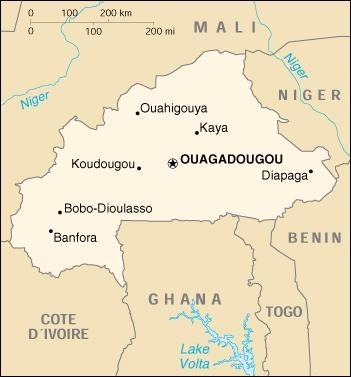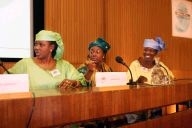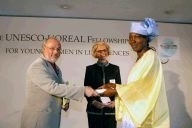 |
| Map of Burkina Faso (google.com) |
Statistics: a branch of mathematics dealing with the collection, analysis, interpretation and presentation of masses of numerical data. (Webster's Dictionary)
 |
| Fati Kirakoya (www.loreal.com) |
Fati Kirakoya loves statistics. It was her love for math and then physical sciences that led to her to graduate with a BACCALAURET C from the University of Ouagadougou in Burkina Faso, Africa. She is now a graduate student focusing on biochemistry and microbiology. Fati is also a L'OREAL-UNESCO, 2005 Women in Science, Fellow, chosen for her research work in assessing whether sexually transmissible infections or imbalance in vaginal flora, have a role to play in increasing susceptibility to HIV infection in women in her country. HIV infection in Burkina Faso has been on a dramatic rise since the first cases were discovered in 1986. Unaids.org data suggests that of the 12.6 million people that make up Burkina Faso, up to 490,000 are now living with HIV/Aids. Most go untreated, as the Anti Retro Virus drugs known as AVR's are still not widely available due to lack of funding, lack of distribution outside of major centers, and superstition of the disease and the drugs that can keep carriers active members of society.
 |
| Burkina Faso, Aids orphans (un.org) |
Madame Kirakoya hasn't always been on the frontlines of this disease, but she has always been a keen student. Asked about her childhood growing up in Ouagadougou, the capital city of Burkina Faso, she says "As a child I always wanted to get a higher education in order to become more independent and to participate in the development of my country". As she grew older and was considering what to do in University she was inspired to become a scientist by her desire to demonstrate that in her culture, young women are capable of excelling in scientific fields.
She said, "The first difficulty I faced was the attitude of others due to my being a woman, and it was necessary to fight hard to be able to convince the hierarchy that a woman can become as much involved in a project as a man. And of course, family pressure that wants a woman to dedicate herself completely to home life." Her present field of research and immunology began after her undergraduate degree, following encouragement from her teachers. "Soon after, I chose HIV as a way of uniting my scientific ambitions and my desire to support my country's development by participating in the fight against this infection, by means of improving our knowledge."
 |
| Aisha Abubakar Abdulwahab, Algeria, Cho N'din Catherine Boni-Cisse, Cote d'Ivoire and Fati Kirakoya, Burkina Faso at the Awards Ceremony |
As a result of becoming a UNESCO-L'OREAL Fellow, Fati was able to realize her dream of continuing her research project about AIDS. She says, "I am still very attached to applied research because it is, for me, a reliable option for sustainable development. Applied research is based on reality, on the local situation, where it proposes solutions or specific approaches. The error committed for a long time by African leaders has been the blind transfer of western technologies without having first defined the necessary adaptations." In her opinion, applied research is one of the principal keys for a better Africa. According to Fati, "The transfer of reliable information regarding local conditions to future generations, the development of university training and the promotion of womens' autonomy are the principal convictions guiding me in this battle."
The first part of Ms. Kirakoya's fellowship includes a statistical study of the sexually-active female population of Ouagadougou. She collected socio-demographic and behavioral data, in the form of a questionnare and biological data in the form of blood, urine and vaginal samples from people who agreed to be in the study. Once analyzed, the biological data will provide evidence for sexually transmissible infections, like HIV.
Ms. Kirakoya is now in the second part of her fellowship which is taking place at the School of Biosciences at the CATHOLIC UNIVERSITY OF LOUVAIN, in BELGIUM. MY HERO called Fati in Belgium to find out how her research was going and how she liked working in this very different University setting. She said that, "The availability of educational materials such as libraries, bookstores, Internet, and competent professors makes it easier to acquire the necessary knowledge in Belgium than in Burkina Faso. The purpose of my research project is to determine if the HIV infection is strongly associated with bacterial vaginosis in the general population. In a time when antibiotic therapy has tended to be held back by the fear of new resistances, and when the vaginal site is difficult to reach by means of oral therapies, a study like this one could open the way to using new products. Products which could restore vaginal equilibrium and create a possible strategy for reducing the incidence of heterosexual transmission of the human immunodeficiency virus (HIV). Training in statistics and epidemiology gives me the tools to achieve useful results from the research.
Available statistics in Burkina Faso which give an indication of the speed of the spread of HIV/AIDS infection, do not reveal the real number of cases which, for the most part, are absent from the official figures. Among other things, health practices, sexual behavior or women's inability to find quality support for treating genital infections could increase susceptibility to these infections. This study aims at improving the data used in communicating about and in fighting HIV, by integrating information from differing factors."
 |
| Fati Kirakoya receiving her Fellowship Certificate from Beatrice Dautresme, Executive VP of L'Oreal and Walter Erdelan, Assistant Director-General of UNESCO |
What advice do you have for girls who want to be scientists?
"I tell them that becoming a scientist is not more difficult for women than for men. It requires passion, commitment, and hard work. It can be very rewarding."
How does your family feel now about your scientific career?
"My parents and my husband are very proud of me. They think my achievements are worth the sacrifices."
Who is your hero and why?
"My Hero is Nelson Mandela because he is a great man, he is brave, he had a dream, and he achieved it."
I hear your country has great music -any recommendations?
"I would suggest Georges Ouedraogo and Bil Aka Kora."
What brings you joy?
"I will be happy the day that people in Africa no longer die from easily treatable diseases and when HIV is under control."
And on an end note -
"I sincerely would like to thank UNESCO and L'OREAL for supporting me. My ultimate objective is to get a PhD in public health in order to implement a Public Health training program in my country. I would also like to learn English because it is very important for scientists. For this I will be very happy to find more support to continue to achieve my dreams."
Page created on 11/15/2011 4:51:54 PM
Last edited 5/13/2020 6:09:36 AM
